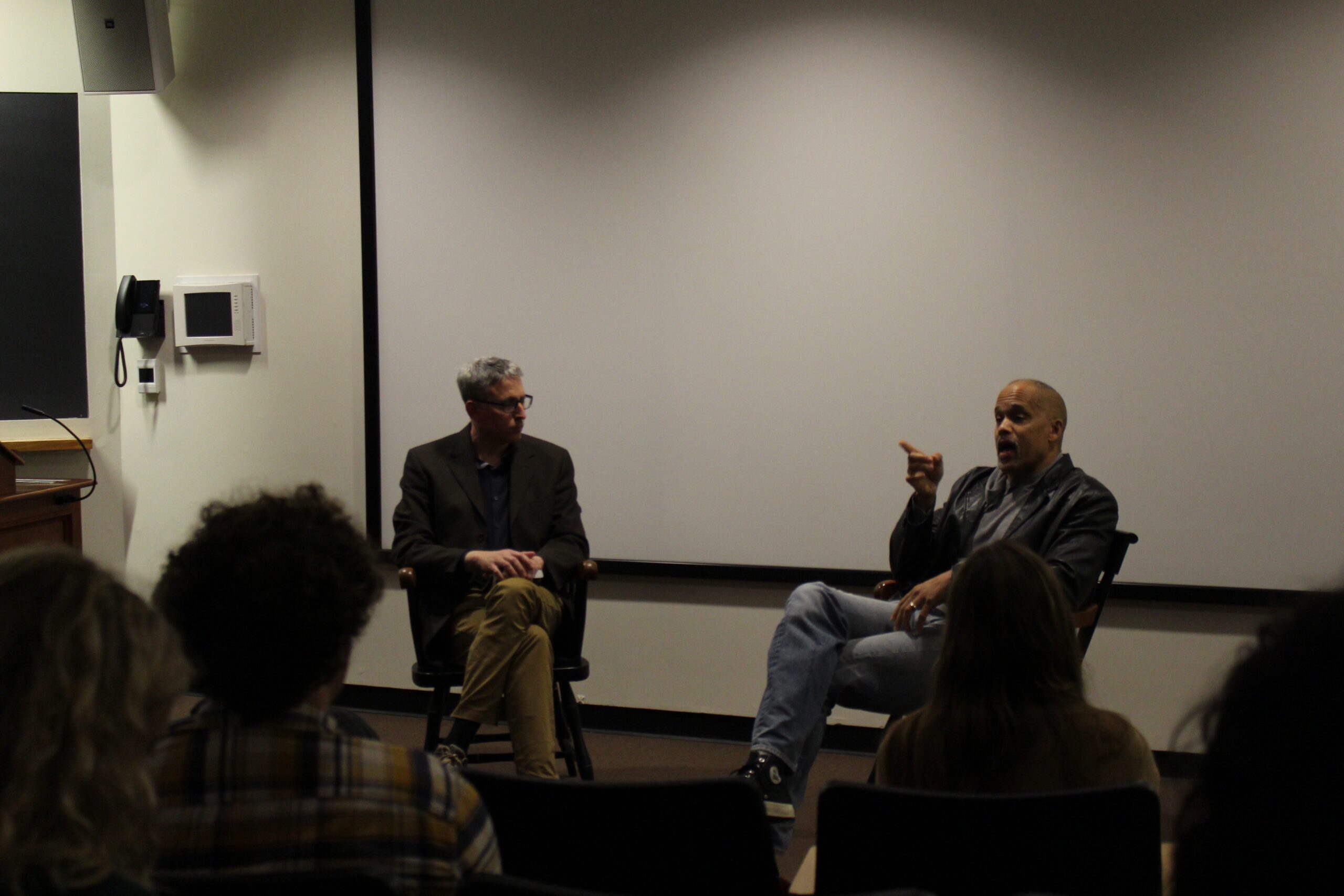Keith Hamilton Cobb performs one-man play and talks about racism in American theater
October 21, 2022
 Carolina Weatherall
Carolina WeatherallOn Tuesday evening, an audience filled the Visual Art Center’s Beam Classroom to watch a screening of the one-man play “American Moor,” written and performed by Keith Hamilton Cobb, a critically acclaimed playwright and classically trained actor. The play delves into the complicated politics of modern American theater, the subtexts of Shakespeare’s “Othello” and the relationship between Black actors and white directors.
Cobb appeared after the screening to answer questions and discuss the formation of his play. “American Moor” features two characters: Cobb, who takes center stage, and the disembodied voice of a director auditioning him for the role of Othello. Inspiration struck after a particularly frustrating audition experience Cobb couldn’t shake off.
“It was such a visceral feeling of this young director, not respecting my age, my awareness, my intellect, all that this person wanted to see during the audition is what I could do for him,” Cobb said during the Q&A following the screening. “He wanted to be impressed by something—I didn’t even know what. And I went home and I wrote this sort of psycho-emotional word salad that came up in, you know, half a day.”
The play, filled with blunt honesty and moments of humor, delves into Cobb’s personal experience as a Black Shakespearean actor in America. Cobb explained that the American theater industry is one filled with white academic elitism which stifles the creative exploration of complex characters like Othello. The tension between a white director and an Black actor auditioning to play Othello is explored and vocalized through Cobb’s monologues. The play is ultimately about an actor struggling to maintain his identity while playing a character through someone else’s eyes.
“I love Shakespeare, I love hearing him speak through me,” Cobb said. “I was building a character based on what I know and I was being told by people who could not have had my experience, or had my awareness of the mechanics of the text, about how the verse worked … tell me there’s a right way to do it.”
Associate Professor of English Aaron Kitch, who organized Cobb’s visit, believes the event has been helpful for students in understanding race and representation in “Othello” and American theater as a whole.
“I remain impressed by the way that his work questions the narratives about race that ‘Othello’ has generated over the years and the way that racial content of the play has historically been supervised by white directors, producers and acting companies who package the play for white audiences,” Kitch said.
At times during the play, it’s just Cobb and the script of “Othello” on the stage, alone, discussing the intricacies of the play. The role of Othello, Cobb explains, must incorporate many things—a lover, a murderer, a Venetian commodity and a Black man.
“People say Othello is a play about race,” Cobb said. “No, it’s a play about inter-partner violence, it’s a play about class, it’s a play about misogyny, it’s a play about nearly everything, and we can go turn on Fox News or MSNBC and hear stories about people behaving just as those people in that play behave, creating tragedy in exactly the same way because humanity does not change.”
During his time performing, Cobb has found that audience members from all walks of life have resonated with his story.
“We realized that this story was not just about me or my experience.… It’s a human story,” Cobb said. “[People] across all sorts of racial and sexual and gender and age spectrums, across all social spectrums, people were standing up and saying, ‘I identify with that.’”
Audience members were similarly moved.
“Watching ‘American Moor,’ for me, was a transformative experience,” audience member Marie Kabongo ’24 said. “As a Black woman who has acted from fourth grade until now, these are the conversations that need to be had.… The pressures that we put on Black folk to perform a certain way doesn’t just apply to actors, but to every Black person existing in a predominantly white space.”
To finish, Cobb related the issues of “Othello” productions to the wider issue of racial inequality in the country.
“The play remains an indictment of privilege, of the overarching white structure that controls all that we do in these United States,” Cobb said. “And that’s hugely dangerous, because it threatens the narrative that we’re all supposed to pick up and run with and accept.”

Comments
Before submitting a comment, please review our comment policy. Some key points from the policy: